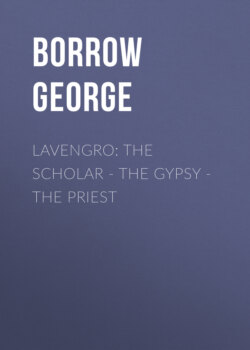Читать книгу Lavengro: the Scholar - the Gypsy - the Priest - Borrow George - Страница 12
На сайте Литреса книга снята с продажи.
X. The Future of Borrow’s Works.
ОглавлениеTable of Contents
He whom London once tried hard, but in vain, to lionise, lived during some of the last years of his life in Hereford Square, unknown to any save about a dozen friends. At the head of them stood Mr. John Murray, whose virtues, both as publisher and as English gentleman, he was never tired of extolling.
Afterwards he went down to East Anglia—that East Anglia he loved so well—went there, as he told me, to die.
But it was not till one day in 1881 that Borrow achieved, in the Cottage by the Oulton Broads which his genius once made famous, and where so much of his best work had been written, the soul’s great conquest over its fleshly trammels, the conquest we call death, but which he believed to be life. His body was laid by the side of that of his wife at Brompton.
When I wrote his obituary notice in the Athenæum no little wonder was expressed in various quarters that the “Walking Lord of Gypsy Lore” had been walking so lately the earth.
And yet his “Bible in Spain” had still a regular sale. His “Lavengro” and “Romany Rye” were still allowed by all competent critics to be among the most delightful books in the language. Indeed, at his death, Borrow was what he now is, and what he will continue to be long after Time has played havoc with nine-tenths of the writers whose names are week by week, and day by day, “paragraphed” in the papers as “literary celebrities”—an English classic.
Apart from Borrow’s undoubted genius as a writer the subject-matter of his writings has an interest that will not wane but will go on growing. The more the features of our “Beautiful England,” to use his own phrase, are changed by the multitudinous effects of the railway system, the more attraction will readers find in books which depict her before her beauty was marred—books which depict her in those antediluvian days when there was such a thing as space in the island—when in England there was a sense of distance, that sense without which there can be no romance—when the stage-coach was in its glory—when the only magician who could convey man and his belongings at any rate of speed beyond man’s own walking rate was the horse—the beloved horse whose praises Borrow loved to sing, and whose ideal was reached in the mighty “Shales”—when the great high roads were alive, not merely with the bustle of business, but with real adventure for the traveller—days and scenes which Borrow better than any one else could paint. A time will come, I say, when not only books full of descriptive genius, like “Lavengro,” but even such comparatively tame descriptions of England as the “Gleanings in England and Wales” of the now forgotten East Midlander, Samuel Jackson Pratt, will be read with a new interest. But why was Borrow so entirely forgotten at the moment of his death? Simply because, like many another man of genius and many a scholar, he refused to figure in the literary arena—went on his way quietly influencing the world, but mixing only with his private friends.
Theodore Watts.
